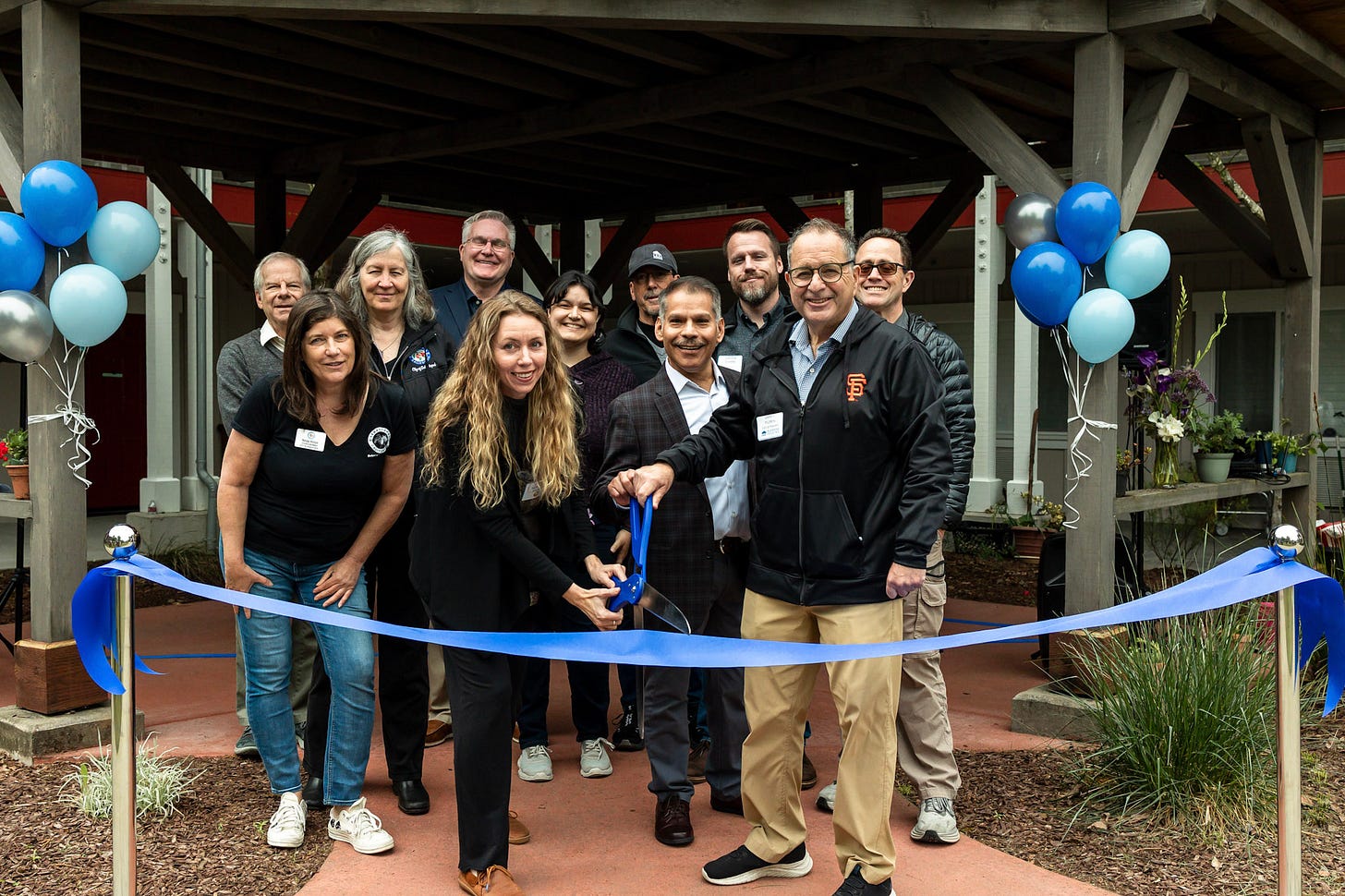Rough start at Elderberry Commons, Part Two
Burbank Housing, good intentions, and the Housing First philosophy

[Editor’s note: This is Part Two of a two-part article. Read Part One.]
The County of Sonoma purchased the Sebastopol Inn in December 2020 for $6,375,000, with $6.2 million in funding from the state’s Project Homekey award program and the remainder from the county. Project Homekey is a $1.4 billion statewide initiative, run by the California Department of Housing and Community Development, aimed at reducing and preventing homelessness throughout California.
At first, during COVID, the property was used as a temporary shelter for medically fragile homeless individuals, but the goal from the beginning was to transform the former inn into permanent supportive housing for the chronically homeless. Ownership of the property was transferred to Burbank Housing in July 2024. Soon after that, the construction began to convert the temporary shelter into 29 studio apartments for the homeless. These renovations cost $2.48 million. The studios, which have small kitchenettes, rent for roughly $1,900 a month.

Elderberry Commons’ new tenants started moving in in mid-March, and in mid-April, Burbank Housing and the County held a small celebration, attended by local politicos, in the building’s central courtyard.
“The city takes great pride in its ongoing commitment to supporting our most vulnerable residents—not only within our municipal boundaries, but also in partnership with the County in its broader efforts,” said City of Sebastopol Mayor Stephen Zollman at the event. “We look forward to working closely with Burbank Housing’s onsite management, whose responsibilities will be to ensure that residents are not only housed but truly embraced as valued members of our community.”
There is no question that the many people who envisioned, worked for and supported the creation of Elderberry Commons did so with the best of intentions. West County Community Services Director Christy Davila’s statement on the occasion of the ribbon cutting captures these hopes.
“As a permanent supportive housing community, Elderberry Commons provides a foundation for residents to not only maintain housing but also to grow and thrive, and that looks different for everyone. Our collaboration with Burbank Housing is key to creating a safe, supportive environment where each person’s path is respected and encouraged,” she said.
It is clear that things aren’t going as well as many had hoped.
Part One of this article dealt with the frequency of police activity at Elderberry Commons and the response of West County Community Services. This section, part two of a two-part article, looks at the response of Burbank Housing, the owner and landlord of the property.
In a previous article on Elderberry Commons, we spoke to Mark Krug, a portfolio analyst for Burbank Housing, who explained how the tenants for the project are chosen.
“All new residents came through Sonoma County’s Coordinated Entry (CE) system. “It’s a county-wide service that maintains lists of homeless people for just these kind of things—referring to services and housing placements. Funding sources usually require that all referrals come from CE, and that is the case here; the state Homekey funding that aided in the acquisition and renovation of the property requires using CE exclusively for referrals.”
“CE organizes the lists by vulnerability,” Krug continued, “meaning that people who have the highest scores on a vulnerability assessment, i.e. the most vulnerable, are given a priority by being at the top of the list. In practice, that means that referrals will typically be people that are chronically homeless, many elderly, and many folks with disabilities and/or major health issues.”
What this benign description leaves out is that some of these residents also arrive with what insurance companies used to call “previous conditions”: alcohol or drug addiction and serious mental health problems.
The Sebastopol Times reached out to both Talia Beaumont, Burbank Housing’s onsite property manager at Elderberry, and Lauren Taylor, Burbank Housing’s Director of Resident Services, hoping to discuss the “growing pains” at Elderberry, outlined in Part One of this article. Both declined to speak to us. Beaumont declined because she said she had only been on the job as Elderberry’s property manager for two weeks.
Taylor wrote this: “I will say that a lot of your questions could be answered by looking at Housing First principles, Sonoma County Coordinated Entry Guidelines and Home Key guidelines. Homelessness is the result of a multitude of factors and some of which are the result of many broken systems in our society. It’s going to take a community to work towards solving that. I hope this piece won’t damper people’s opinions about the many beautiful and transformative things that are happening for the majority of these individuals who are now housed.”
We did hear back from Burbank’s Communications & Public Relations Manager Stefanie Bagala. She pointed to the state’s Housing First policy as a context for our discussion, noting state law mandates that all state-funded housing programs—including Project Homekey which funded Elderberry Commons—adhere to Housing First principles.
She sent a copy of Homekey Round 3 Housing First Guidance, which is worth quoting at length:
According to Housing First law (SB 1380), the “Core components of Housing First” means all of the following:
Tenant screening and selection practices that promote accepting applicants regardless of their sobriety or use of substances, completion of treatment, or participation in services.
Applicants are not rejected on the basis of poor credit or financial history, poor or lack of rental history, criminal convictions unrelated to tenancy, or behaviors that indicate a lack of “housing readiness.”
Acceptance of referrals directly from shelters, street outreach, drop-in centers, and other parts of crisis response systems frequented by vulnerable people experiencing homelessness.
Supportive services that emphasize engagement and problem solving over therapeutic goals and service plans that are highly tenant-driven without predetermined goals.
Participation in services or program compliance is not a condition of permanent housing tenancy. Tenants have a lease and all the rights and responsibilities of tenancy, as outlined in California’s Civil, Health and Safety, and Government codes.
The use of alcohol or drugs in and of itself, without other lease violations, is not a reason for eviction.
In communities with coordinated assessment and entry systems, incentives for funding promote tenant selection plans for supportive housing that prioritize eligible tenants based on criteria other than “first-come, first-serve,” including, but not limited to, the duration or chronicity of homelessness, vulnerability to early mortality, or high utilization of crisis services. Prioritization may include triage tools, developed through local data, to identify high-cost, high-need homeless residents.
Case managers and service coordinators who are trained in and actively employ evidence-based practices for client engagement, including, but not limited to, motivational interviewing and client-centered counseling.
Services are informed by a harm-reduction philosophy that recognizes drug and alcohol use and addiction as a part of tenants’ lives, where tenants are engaged in nonjudgmental communication regarding drug and alcohol use, and where tenants are offered education regarding how to avoid risky behaviors and engage in safer practices, as well as connected to evidence-based treatment if the tenant so chooses.
The project and specific apartment may include special physical features that accommodate disabilities, reduce harm, and promote health and community and independence among tenants.
“The whole point of Housing First is to get really the most vulnerable individuals into a house quickly,” Bagala said. “So that is why you could have people that are still using drugs coming into a unit. And that’s the reality of the landscape…it’s a requirement to adhere to Housing First guidance of a Homekey property, right? So, the first point says literally, “Tenant screening and selection practices and promote assessing applicants, regardless of the sobriety or use of substances, completion of treatment or participation in services.” We can’t basically say, like, you can’t use drugs at the house or at the property.”
Interestingly, the lease for Elderberry Commons, which we acquired elsewhere after Burbank Housing refused to supply a copy, has provisions that allow termination for exactly that—as well as many other things, including criminal activity.
Regarding the allegations of drug use and, in one case, prostitution, which we covered in Part One of this article, Bagala counseled patience.
“We just opened in March, and like a lot of permanent supportive housing properties, there can be an adjustment period,” she said, noting how many team members Burbank and West County Community Services had onsite to help with resident support services. “These efforts are supporting the residents to try and help them transition to permanent housing. A lot of times when these properties come about, there is a transition period as they [the residents] learn how to live independently again.”
“We’ve had multiple permanent supportive housing properties that we’ve brought to fruition, and we are accustomed to the natural transition period there,” she said. “And for some people, you know, it does take longer for them to acclimate.”
“At the end of the day, we’re not just ignoring it, though,” she added. “There's a transition, but these issues are definitely being addressed.”
Despite the complaints of some tenants, Bagala said, “The majority of them are really happy and thrilled to be there.”
That may be true, but it’s clear that not everyone is thrilled. The calls to the Sebastopol Police keep coming.
Yesterday—the day Part One of this article posted—I sat across the street at Cock Robin, eating a chicken sandwich, and watched as two police cars, sirens screaming, pulled into the Gravenstein Station parking lot and headed toward Elderberry Commons. (In this case, it was a domestic disturbance.)
“It feels like we’re getting more and more calls,” said Police Chief Sean McDonagh. “I don’t know if some of that’s associated with the frustration of some of the people that live there, and this is them just calling more and more often because they’re becoming frustrated. No one’s listening to them, right? They don’t feel like anything’s being done.”
He also said there’s some confusion over what’s a police matter and what’s not.
“It seems like there’s a muddying of the waters with who’s responsible for what in that location,” he said. “Residents call us about leasing issues or people being allowed into the property that we have no control over. That's not a police problem. While we would prefer that they [the management] maintain their property and vet who comes in and out and then vigilantly enforce their lease conditions, we have no control over that. So it’s trying to get those people to understand our role versus that of Burbank Housing and then where WCCS falls into that.”
“The involved organizations need to somehow be held to the leasing model that they’ve built, so that we can do our job effectively and provide public safety and a safe place for all of our citizens.”



The flaw in "Housing First," which IS the recognized policy and orthodoxy among government and academic policy analysts and prescribers, is that it is based on getting people housed first and dealing with their problems later. Makes some sense in principle, if those problems in fact become addressed. In practice, however, this repeats the failed experience of "urban renewal" and housing projects in the 1960s, which became crime- and drug-infested warehouses for otherwise vulnerable people, as here now. And what logic, or common sense, or wisdom gained from experience, lumps this disparate group of families, drug users, and prostitutes together based on a point system that ignores compatibility and curative factors? The illusion of "equality" and "equal protection" ignores that one size does not fit all, without consideration of disparate needs and disparate impacts.
Good reporting on a difficult subject that is now Sebastopol-centric.
Excellent resourceful and valuable reporting. Well done.